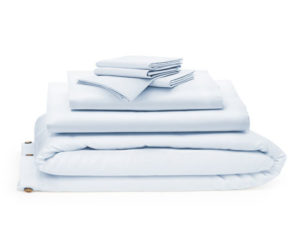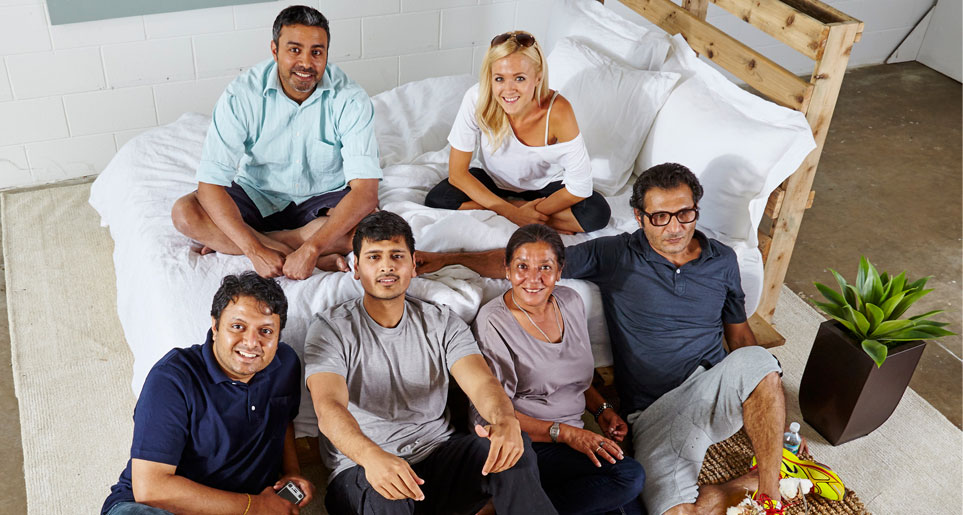A small Minnesota-based company has a big vision: provide high quality, Fair Trade, organic cotton bedding at an affordable price, while enriching the livelihood of small farmers in India and stimulating the switch from GMO to organic, non-GMO cotton growing.
Vishal Naithani and Sachin Chauhan, co-founders of SOL (Sustained Organic Living) Organics, have worked in the sustainable marketplace for 20 years; they seized an opportunity when they saw it. After launching a successful private wholesale business sourcing essential oils and aromas for major U.S. companies, they shifted their interest to organic cotton.
“We knew the landscape,” Vishal said. “From our materials management background, we knew what to watch for in the tricky landscape of organic cotton. Our motivator was to try to make a difference, by tracing the product back to the farmers and co-ops that produce it. We wanted total transparency with integrity as our core value.”

Indian cotton farmers with organic cotton
Seizing a golden opportunity in organic cotton
What made organic cotton an enticing market to enter? “We saw the gimmickry around thread counts, lack of supply chain transparency and the markups being taken by companies on the certified organic cotton premium,” Vishal explained. “Either the sheets were well made and overpriced, or they were made with inflated thread counts using conventional cotton, which has devastating human and environmental effects.”
The team bought sheets from high-end retailers and had them examined at a textile lab. The most luxurious were 300 count, long-staple cotton, single-ply sheets. They researched organic textile factories and found one that met their requirements—manufacturing non-GMO, certified organic cotton, with GOTS (Global Organic Textile Standard) and FLO (Fairtrade International) certifications.
Cotton crops occupy 2.5 percent of the world’s cultivated land, but conventional cotton accounts for 25 percent of pesticide use. In India, genetically modified Bt cotton has had disastrous consequences. Child labor abuses are high; many of the farmers are women, who often receive less money than male workers. Illiterate, poor farmers with little money pay exorbitant fees for raw materials, hoping that good harvests will enable them to repay the brokers. In bad years, many bankrupt farmers have committed suicide.
“It’s a monetized marketplace, and you can’t expect Indian farmers to be that sophisticated,” Vishal said. “They’re just trying to make a living.”
India produces 70 percent of the global organic cotton supply. Rainfed irrigation minimizes the water needed to grow the crop; organic cotton requires 71 percent less water and 62 percent less energy.
Creating the Fair Price model
Once the factory was found, their job of branding, marketing, and distribution began. Why don’t people buy organic cotton clothes or bedding as readily as they purchase organic food?
“We thought, if we can provide consumers with a decent price—by cutting out the middleman—we’ll draw more buyers,” Vishal said. “Raw fair
trade certified organic cotton is only 7 to 10 percent more than conventional cotton… the true cost of fair trade certified organic cotton sheets should not be as exorbitant as they currently are. We can achieve our margin, while providing good wages to the farmer, why not do it?”

Caption: SOL Organics cotton bedding
Prices for SOL Organic sheets are 30 to 50 percent less than comparable ones online, though still twice as pricey as conventional sheets. “We absorb the other costs. Others have up to a five-fold mark-up, but we refuse to mark up what it costs for our products to be fair trade and organic, beyond the initial premium,” Vishal said.
Believing that every family should have access to organic cotton just like organic food, Vishal says affordability is the tipping point. “It promotes access, which in turn creates demand and conversion to organic cotton.”
Increased demand for organic cotton is a central part of SOL Organic’s mission—increasing organic acres. It’s a win for farmers, consumers, and the planet. “From a resource management perspective, organic is just better,” Vishal said.
SOL Organics offers biodegradable and recyclable sheets, pillowcases, duvet covers, and baby crib sheets. Consumers are happy; the return rate for purchases is less than 3 percent. The biggest challenge is getting the narrative out. “It’s a game of patience,” Vishal said. But people do want to support fairly treated workers, pesticide-free farming, and prevention of labor abuses.
“Cotton is responsible for so many livelihoods,” Vishal noted. “Give consumers the true narrative, and a fair price, and they’ll make the right choice.”









